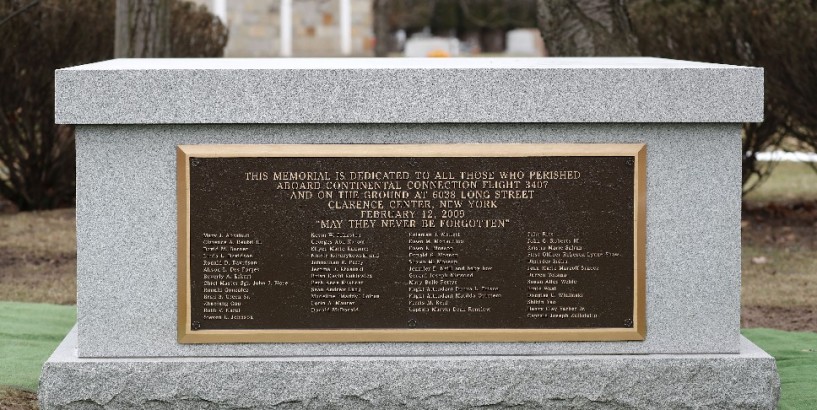It was some of the best news Flight 3407 families had received since the law was passed in 2010. Since then, industry and government officials have been bent on gutting it. Now, federal officials say, the law is safe, at least for now. Its advocates are breathing a sigh of relief.
They should. But they should also keep a wary eye.
The families in question are the Families of Continental Flight 3407. The law is the one passed in the aftermath of that plane’s fatal crash in Clarence 10 years ago. The industry is airline and government officials are its lackeys.
This week, though, the families met with Transportation Secretary Elaine Chao and Daniel Elwell, acting administrator of the Federal Aviation Administration. They came away assured that the Trump administration not try to weaken the law’s critical training requirements – the boogeyman of the industry and its congressional toadies – and would also move to enact another important aspect of the law that, for dubious reasons, has been largely ignored.
It’s all good news. It can hardly be a coincidence that the law’s enactment has coincided with the safest period ever for American civilian aviation. In the two decades before Congress passed this law, 1,186 people died in U.S. commercial plane crashes. Since the law was approved, only one person has died, last year when a window on a Southwest Airlines jet shattered.
It’s no surprise why. The law’s mandate for 1,500 hours of flight experience for pilots and co-pilots before flying for a commercial airline grew directly out of the tragedy of Feb. 12, 2009.
On that wintry night, Capt. Marvin Renslow took the exact wrong action when the Bombardier Dash 8-Q400 he was piloting from Newark went into a stall. Instead of recovering the flight – which, by all accounts, was well within the ability of a competent pilot – he sealed its fate.
Later, investigators learned that Renslow was poorly trained. He had failed five “check rides” meant to test his skill. Nevertheless, he was allowed to pilot that plane. Two of the tests had been conducted after he began working for the airline. Officials knew about one previous failure, but not the other two. In addition, he had not trained on a safety system for that airplane.
Other revelations showed that the crew violated protocols on in-flight conversation and that co-pilot Rebecca Shaw was working despite being sleep deprived. She may also have become ill as the flight began.
The 2010 law attacked all those issues. Despite pressure from the industry, the flight experience requirement remains and Chao this week affirmed it. The law also requires a minimum amount of uninterrupted rest for pilots and limits the number of consecutive hours they can fly.
What hasn’t been implemented – and what Chao promised to attend to – is the creation of a database of pilot records so that airlines can access relevant information about pilot candidates. In Clarence, that resource might have saved 50 lives.
The excuse for failing to create the database is simply not credible. Its internet sign-on software is insecure and the federal rule that would allow the database to be implemented hasn’t been finalized. After nine year? Why not? It's hard to believe the FAA’s own resistance to the law isn’t involved.
Nevertheless, Chao’s comments were a welcome antidote to the skepticism she expressed about the law only last June. On Wednesday, she walked them back some. As Marilyn Kausner, a family member, recounted, Chao seemed “anxious to reassure us that there’s no efforts being made right now to roll back that 1,500-hour rule.”
That’s good – right now. Chao’s comments were welcome, indeed. But given the hostility to the law previously expressed by both government officials and the airline industry, the Families of Flight 3407 would do well to remain vigilant. It wouldn’t be the first time this administration reversed itself on an issue important to Western New York.









